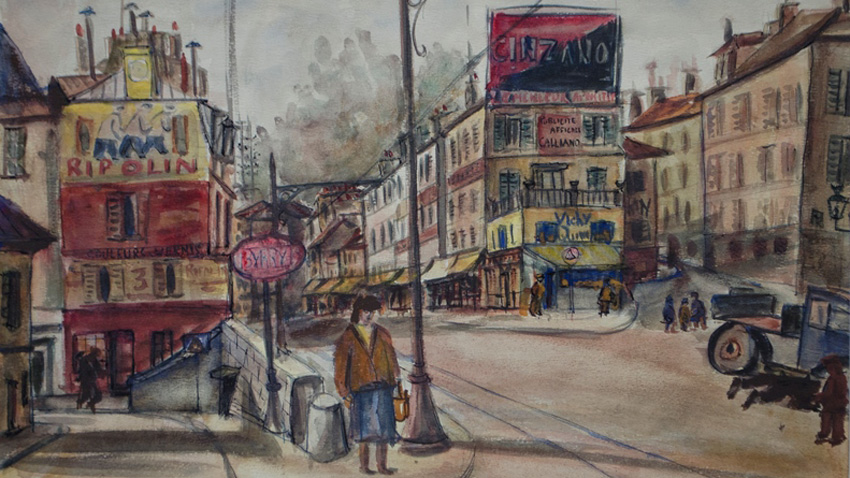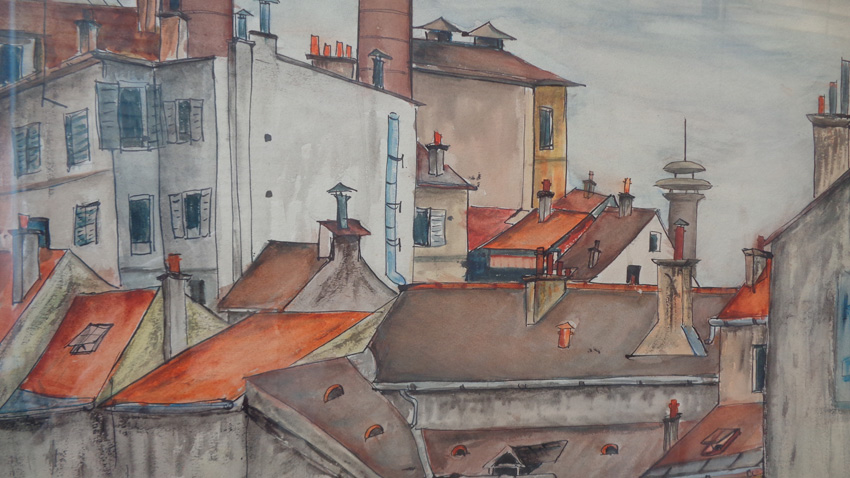Nuance Gallery in Sofia presents an exhibition of ceramics and paintings of one of Bulgaria's most celebrated artists - Georgi Bakardzhiev. Mr. Bakardzhiev's life was full of difficulties and craving for art. He was born at the end of the 19th century to the family of a coppersmith. Georgi Bakardzhiev witnessed the decay of the crafts in his native town of Karlovo (Central South Bulgaria). He also lived through the period when Bulgaria suffered a series of ordeals in the wars of the first decades of the 20th century. Georgi Bakardzhiev left his country like many Bulgarians who were in pursuit of their American dream. His father told him: Go and don't come back if you do not succeed. However, Georgi found himself in Paris on his way to America. He was captivated by the beauty of the French capital and stayed near the Seine River for many years.

Radio Bulgaria talked with his daughter architect Olga Bakardzhieva:
 “He wanted to become a decorator in Paris. However, his application was rejected everywhere. He thought that it was very unlikely to get a job at one of the biggest parlors, but to his great surprise he was employed on a probationary period. Later he stayed there and gradually began to acquire skills in decorating. He painted with gold on glass. Meanwhile, he learnt to light furnaces which were used during the creative process. I remember one of the stories my father once told me. He went to another workshop, in order to learn how to light furnaces. The director of the company wanted to meet the man who taught my father how to do the job. At one point my father realized that he had to switch the furnace off, because the temperature threatened to destroy all works of art and turned it off at his own discretion. When the craftsman came back he felt indignant of my father's actions. Fortunately, to his big surprise, none of the items were discarded.”
“He wanted to become a decorator in Paris. However, his application was rejected everywhere. He thought that it was very unlikely to get a job at one of the biggest parlors, but to his great surprise he was employed on a probationary period. Later he stayed there and gradually began to acquire skills in decorating. He painted with gold on glass. Meanwhile, he learnt to light furnaces which were used during the creative process. I remember one of the stories my father once told me. He went to another workshop, in order to learn how to light furnaces. The director of the company wanted to meet the man who taught my father how to do the job. At one point my father realized that he had to switch the furnace off, because the temperature threatened to destroy all works of art and turned it off at his own discretion. When the craftsman came back he felt indignant of my father's actions. Fortunately, to his big surprise, none of the items were discarded.”
Thus, Georgi Bakardzhiev started to paint with gold, platinum and enamel on glass. He improved step by step. He visited the Sorbonne and attended the classes of celebrated sculptor Antoine Bourdelle. He attended lectures dedicated to history of art, as well as to Byzantine architecture and art. Thus, Georgi Bakardzhiev broadened his cultural scope. He established his own workshop and worked as a freelancer. He was nearly thirty when he attended a French exhibition in New York. In 1930 he took part at the world exhibition for applied arts in Liege, Belgium and was awarded with the Grand Prix international award and a gold medal. His ceramic and glass works brought him the top prize at a contest in ceramics and glass in Cairo. It is interesting to note that he refused to take his gold medal but only took his diploma, because he thought that it was more than enough for him. Later he left his diploma somewhere in his workshop. One of his friends who visited the workshop saw Georgi's diploma rolled up. He was shocked when he learned that Georgi received such a high distinction and did not pay attention to it. He told Georgi Bakardzhiev: You will have a brilliant career. Indeed, that award allowed him to have access to a series of prestigious forums and artistic communities. In 1940 he returned to Bulgaria. He brought many of his works with him and accentuated on the art techniques he acquired in France.

“In the 1950's he started to tour Bulgaria, in order torecreate folk forms in contemporary look. 300 of his samples were displayed at an exhibition. He made a real furor with that exhibition”, Mrs. Bakardzhieva recalls. “His exposition received Dimitrov's prize. Meanwhile, he continued painting. He even started to write. My father used to say that people should change their profession at least once during the socialism. Then he wrote and published three books: Ceramics in Bulgaria, Wrought Copper and Businska Ceramics. Meanwhile, he worked as an art critic and various daily newspapers and magazines used to publish his articles. He is also an author of many essays and poems”, Olga Bakardzhieva concludes.
English version: Kostadin Atanasov
The "Invisible Sofia" cycle this year will end with the "Artisans of Sofia" exhibition, dedicated to movable cultural heritage. The exhibition will be opened today in the renovated Central Sofia Market Hall. "In 2025, we will..
The famous folklore ensemble Trakia celebrates its 50th anniversary with a gala concert tonight in Hall 1 of the National Palace of Culture (NDK). The instrumentalists, choir singers and dancers will perform excerpts from their repertoire in a show..
The long-awaited premiere of Ballet Arabesque's The Dante Secret has captivated Bulgarian cultural circles and become the focus of discussion since the end of the last theatre season. The production is created by an extremely strong artistic team,..

+359 2 9336 661
